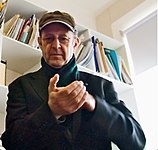Steve Reich, Date of Birth, Place of Birth
TweetSteve Reich
American composer
 Date of Birth: 03-Oct-1936
Date of Birth: 03-Oct-1936
 Place of Birth: New York City, New York, United States
Place of Birth: New York City, New York, United States
Profession: writer, composer, musician, videographer
Nationality: United States
Zodiac Sign: Libra 
About Steve Reich
- Stephen Michael Reich ( born October 3, 1936) is an American composer who, along with La Monte Young, Terry Riley, and Philip Glass, pioneered minimal music in the mid to late 1960s.Reich's work is marked by its use of repetitive figures, slow harmonic rhythm, and canons.
- His innovations include using tape loops to create phasing patterns, as on the early compositions It's Gonna Rain (1965) and Come Out (1966), and the use of simple, audible processes, as on Pendulum Music (1968) and Four Organs (1970).
- The 1978 recording Music for 18 Musicians would help entrench minimalism as a movement.
- Reich's work took on a darker character in the 1980s with the introduction of historical themes as well as themes from his Jewish heritage, notably Different Trains (1988). Reich's style of composition has influenced many contemporary composers and groups, especially in the US.
- Writing in The Guardian, music critic Andrew Clements suggested that Reich is one of "a handful of living composers who can legitimately claim to have altered the direction of musical history".
- The American composer and critic Kyle Gann has said that Reich "may ...
- be considered, by general acclamation, America's greatest living composer".
Read more at Wikipedia
See Also
- Famous People's Birthdays on 03 October, United States
- Famous People's Birthdays in October, United States
- Famous writer's Birthdays on 03 October, United States
- Famous writer's Birthdays in October, United States
- Famous composer's Birthdays on 03 October, United States
- Famous composer's Birthdays in October, United States
- Famous musician's Birthdays on 03 October, United States
- Famous musician's Birthdays in October, United States
- Famous videographer's Birthdays on 03 October, United States
- Famous videographer's Birthdays in October, United States

